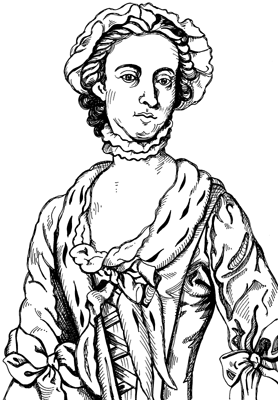 |
 |
|||
|
|
Mary Blandy was the only child of Francis Blandy, an attorney and town clerk of Henley-upon-Thames in Oxfordshire, and his wife, Anne, the 2nd daughter of Thomas Stevens of the same town. Her paternal grandfather was John Blandy of Letcombe Bassett and her maternal great grandfather was Richard Stevens of Culham Court in Wargrave, both in Berkshire. It was said that Francis had a fortune of £10,000 which he would be able to leave to his daughter. An avaricious officer in the marines, named William Henry Cranstoun, son of William, 5th Lord Cranstoun, proposed to marry her. The two were lovers for six years, often meeting along 'Miss Blandy's Walk' at Park Place across the Thames in Remenham. The father, however, objected, suspecting Cranstoun to be already married. He had, in fact, married a certain Anne Murray in 1745. Thereupon Cranstoun induced Miss Blandy to administer arsenic in small doses to her father. He died, after some mouths, on 14th August 1751. Mary was immediately detained in her room; but, on finding the door open, she went for a walk around Henley. The townsfolk were not happy and chased her over the bridge into Remenham where she took refuge with her friend, Mrs. Davis, the landlady of the ‘Little Angel’, before being taken back into custody. Miss Blandy was tried at Oxford, on 3rd March 1752, convicted upon strong evidence, including that of her father's physician, Anthony Addington. She was hanged on 6th April 1752, her last request being that, for the sake of decency, she should not be hoisted too high. Much attention was aroused at the time, especially by the pathetic circumstance that the father, when he knew himself to be dying by his daughter's hands, only pitied her and tried to prevent her committing herself. He appears to have thought that she mistook the poison, which she received from Cranstoun, for a potion intended to win his favour to the match. This view was suggested at the trial and solemnly asserted by Miss Blandy at her death, but is inconsistent with many facts brought out in evidence. Cranstoun escaped, but died on 2nd December 1752. It was remarked as a strange coincidence that a banker in the Strand, named Gillingham Cooper, received, as lord of the manor at Henley, the forfeiture of two fields belonging to Miss Blandy; and of a malthouse belonging to a Miss Jefferys who, on 28th March 1752, was hanged for the murder of her uncle at Walthamstow. Edited from Leslie Stephen's 'Dictionary of National Biography' (1886). |
|||
| © Nash Ford Publishing 2008. All Rights Reserved. | ||||



 Mary Blandy (1720-1752)
Mary Blandy (1720-1752)